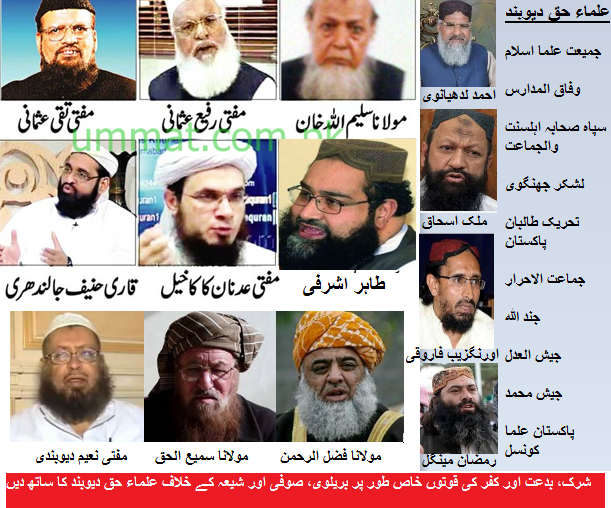Media Discourse on Deobandi Terrorism – May 19 to June 07, 2015
Centres Of Ignorance
The Nation
Dawn
When religious organisations got wind of the minister’s remarks, a storm of condemnation broke, particularly from the Deobandi elements. The Wafaqul Madaris Al Arabia, the board representing the country’s Deobandi seminaries, in a demonstration outside the National Press Club in Islamabad demanded the minister’s resignation and the registration of cases against him.
Source:
http://www.dawn.com/news/1182784
FBR invites religious scholar to ‘motivate’ customs officers
Dawn
In his early 60s and a member of the Tableeghi Jamaat that subscribes to the Deobandi school of thought, Maulana Jamil is a well-known orator.
Source:
http://www.dawn.com/news/1182820/fbr-invites-religious-scholar-to-motivate-customs-officers
Curious case of Bihari mullahs
The Times of India
It would be pertinent to point out that the city has been a bastion of the Sufis, or those who subscribe to the Barelwi school of thought. As opposed to this, the Biharis, and those from Uttar Pradesh, have usually gravitated towards the Deobandi school of thought. The mild antagonism of the Bihari aalim may well be on account of differences of opinion on ecclesiastical and jurisprudential matters.
Source:
Understanding the new militants of Pakistan
Muhammad Aamir Rana
Kashmir Monitor
While the Punjabi Taliban emerged from Deobandi and Salafi militant groups, the Jundullah groups are breakaway factions of the Jamaat-e-Islami (JI) and its student and militant wings. With the exception of Jundullah in the Iranian Balochistan region, the remaining entities under this label, active in Karachi and the Peshawar valley, are of a similar disposition. With their Islamist background, they are naturally inclined towards the Islamic State (IS) militant group and like a few commanders of the Hizb-e-Islami — a JI-affiliate in Afghanistan — apparently intend to announce their allegiance to the IS.
Source:
http://kashmirmonitor.in/news-understanding-the-new-militants-of-pakistan-85017.aspx
Pakistan of the Ismailis
May 22, 2015
The News
As a schoolgoing boy, I would meet some men from these families at the Deobandi Jamia mosque where they used to pray every Friday with other Muslims. Everyone knew that Ismails were required to say their prayers at the largest Muslim mosque in the area if a mosque of their own denomination was not available. These Ismaili families later shifted to Multan where they became part of the thriving Ismaili business community.
Going back to my own Deobandi mosque, I saw Ismailis praying there till the 1980s, the decade when the Middle East, with its heavy baggage of violent sectarian history, arrived in this part of South Asia. In 1990, a 14-year-old boy killed a crippled Shia worshipper at a Sunni mosque in Muzaffargarh considering his regular presence an abomination for the sacred place. Incidentally, the mosque was built by the Shia owners of a nearby factory.
Source:
http://www.thenews.com.pk/Todays-News-9-319508-Pakistan-of-the-Ismailis
Besides madrassas, varsities also on watch list
He noted that the Jundullah had emerged from the JI and its sister organisation, the Islami Jamiat-e-Talaba. The Punjabi Taliban, he added, were breakaway factions of the Deobandi and Salafi jihadist groups.
Source:
http://www.thenews.com.pk/Todays-News-4-319617-Besides-madrassas-varsities-also-on-watch-list
Ominous signs: the rise of Pakistan Rah-e-Haq Party
May 31, 2015
The News
Initially, the ASWJ (or the SSP before imposition of ban on it), was organised in Punjab and Karachi. In recent years, their main focus is Balochistan and KP, where the Jamiat Ulema-e-Islam-Fazl (JUI-F) is a strong political party, which also follows Deobandi school of thought. “The shifting of the ASWJ’s central leadership from Punjabi to Pashtun is aimed at spreading the party in the KP and Fata,” says Ahmed Ali, a political scientist in Islamabad.
Source:
http://tns.thenews.com.pk/ominous-signs-rise-of-pakistan-rah-e-haq-party/
Iqbal, Maududi and Pakistani nationalism
Tahir Kamran
May 31, 2015
The News
The point worth noting here is that Iqbal’s message was used for setting the tone for seminary-trained mullahs (largely of Deobandi persuasion) to claim ownership of Pakistan. Maududi was not only an exponent of the idea of an Islamic state but on several occasions joined hands with these mullahs from seminaries.
Source:
http://tns.thenews.com.pk/iqbal-maududi-and-pakistani-nationalism/
Redeeming the Pashtun, the ultimate warriors
During the Soviet occupation of Afghanistan in the 1980s, military dictator Zia ul Haq, with the help of Saudi Arabia’s Wahhabis and funding from the U.S., had embarked on a Machiavellian program to create an army of holy warriors that would cause havoc for the Red Army in Afghanistan. The guinea pigs for this cynical social experiment were the Pashtuns. Religious seminaries in the Pakistani Tribal Areas became the centre of jihad ideology, incorporating elements of Wahhabi religious doctrine into the predominantly Deobandi Islam practised by the Pashtuns.
Source:
http://www.macleans.ca/news/world/redeeming-the-pashtun-the-ultimate-warriors/
Pakistani man caught with $20K weapons cache in Peterborough, Ont., will be deported within the month: CBSA
June 1, 2015
The National Post
The CBSA had linked him to the SSP through his association with Pakistani Deobandi cleric and former jihadist fighter Ilyas Ghuman. Canadian officials said Ansari had been involved with the terror group since before coming to Canada and had been soliciting funds and promoting its goals online.
Source:
Why Pakistan is the problem and not any possible solution for Afghanistan
June7, 2015
According to information from Pakistan, the growing influence of IS in the Afghanistan-Pakistan region has led to the formation of a local affiliate of IS called Khorasan Shoora. This, coupled with pressure on Taliban to reconcile with Kabul, has divided the group with some hardliners crossing over to IS. While Afghan authorities are not writing off the threat, Gen John Campbell, the NATO Commander in Afghanistan has said that IS is not operational, though their agents are recruiting fighters from AfPak region who are mainly Taliban turncoats. The turf war between IS and Taliban will take off only when there is a big split in the Taliban. The proliferation of Jihadi armed groups like IS following extreme form of Sunni Wahhabism amounting to Salafi ideology, and local militias and Taliban espousing Deobandi thought will congest the ideological battlefield, multiplying violence. This noisy scenario is not what Afghanistan needs.
Source:

